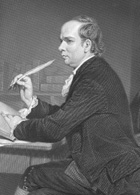Oliver Goldsmith Biography
Oliver Goldsmith was an Anglo-Irish writer and poet, who is best known for his novel The Vicar of Wakefield (1766), his pastoral poem The Deserted Village (1770), and his plays The Good-Natur'd Man (1768) and She Stoops to Conquer (1771, first performed in 1773). He also wrote An History of the Earth and Animated Nature. He is thought to have written the classic children's tale The History of Little Goody Two-Shoes, the source of the phrase "goody two-shoes".
Goldsmith's birth date and year are not known with certainty. According to the Library of Congress authority file, he told a biographer that he was born on 29 November 1731, or perhaps in 1730. Other sources have indicated 10 November, on any year from 1727 to 1731. 10 November 1730 is now the most commonly accepted birth date.
The location of his birthplace is also uncertain. He was born either in the townland of Pallas, near Ballymahon, County Longford, Ireland, where his father was the Anglican curate of the parish of Forgney, or at the residence of his maternal grandparents, at the Smith Hill House in the diocese of Elphin, County Roscommon where his grandfather Oliver Jones was a clergyman and master of the Elphin diocesan school. When he was two years old, Goldsmith's father was appointed the rector of the parish of "Kilkenny West" in County Westmeath. The family moved to the parsonage at Lissoy, between Athlone and Ballymahon, and continued to live there until his father's death in 1747.
In 1744 Goldsmith went up to Trinity College, Dublin. His tutor was Theaker Wilder. Neglecting his studies in theology and law, he fell to the bottom of his class. He was graduated in 1749 as a Bachelor of Arts, but without the discipline or distinction that might have gained him entry to a profession in the church or the law; his education seemed to have given him mainly a taste for fine clothes, playing cards, singing Irish airs and playing the flute. He lived for a short time with his mother, tried various professions without success, studied medicine desultorily at the University of Edinburgh and the University of Leiden, and set out on a walking tour of Flanders, France, Switzerland and Northern Italy, living by his wits (busking with his flute).
He settled in London in 1756, where he briefly held various jobs, including an apothecary's assistant and an usher of a school. Perennially in debt and addicted to gambling, Goldsmith produced a massive output as a hack writer for the publishers of London, but his few painstaking works earned him the company of Samuel Johnson, with whom he was a founding member of "The Club". The combination of his literary work and his dissolute lifestyle led Horace Walpole to give him the epithet inspired idiot. During this period he used the pseudonym "James Willington" (the name of a fellow student at Trinity) to publish his 1758 translation of the autobiography of the Huguenot Jean Marteilhe.
Goldsmith was described by contemporaries as prone to envy, a congenial but impetuous and disorganised personality who once planned to emigrate to America but failed because he missed his ship.His premature death in 1774 may have been partly due to his own misdiagnosis of his kidney infection. Goldsmith was buried in Temple Church. The inscription reads; "HERE LIES/OLIVER GOLDSMITH". There is a monument to him in the center of Ballymahon, also in Westminster Abbey with an epitaph written by Samuel Johnson
Good people all, of every sort,
Give ear unto my song;
And if you find it wondrous short,
It cannot hold you long.
...
O MEMORY, thou fond deceiver,
Still importunate and vain,
To former joys recurring ever,
And turning all the past to pain:
...
Sweet Auburn! loveliest village of the plain,
Where health and plenty cheered the labouring swain,
Where smiling spring its earliest visits paid,
And parting summer's lingering blooms delayed:
...
Beside yon straggling fence that skirts the way
With blossom'd furze unprofitably gay,
There, in his noisy mansion, skill'd to rule,
...
LONG had I sought in vain to find
A likeness for the scribbling kind;
The modern scribbling kind, who write
...
